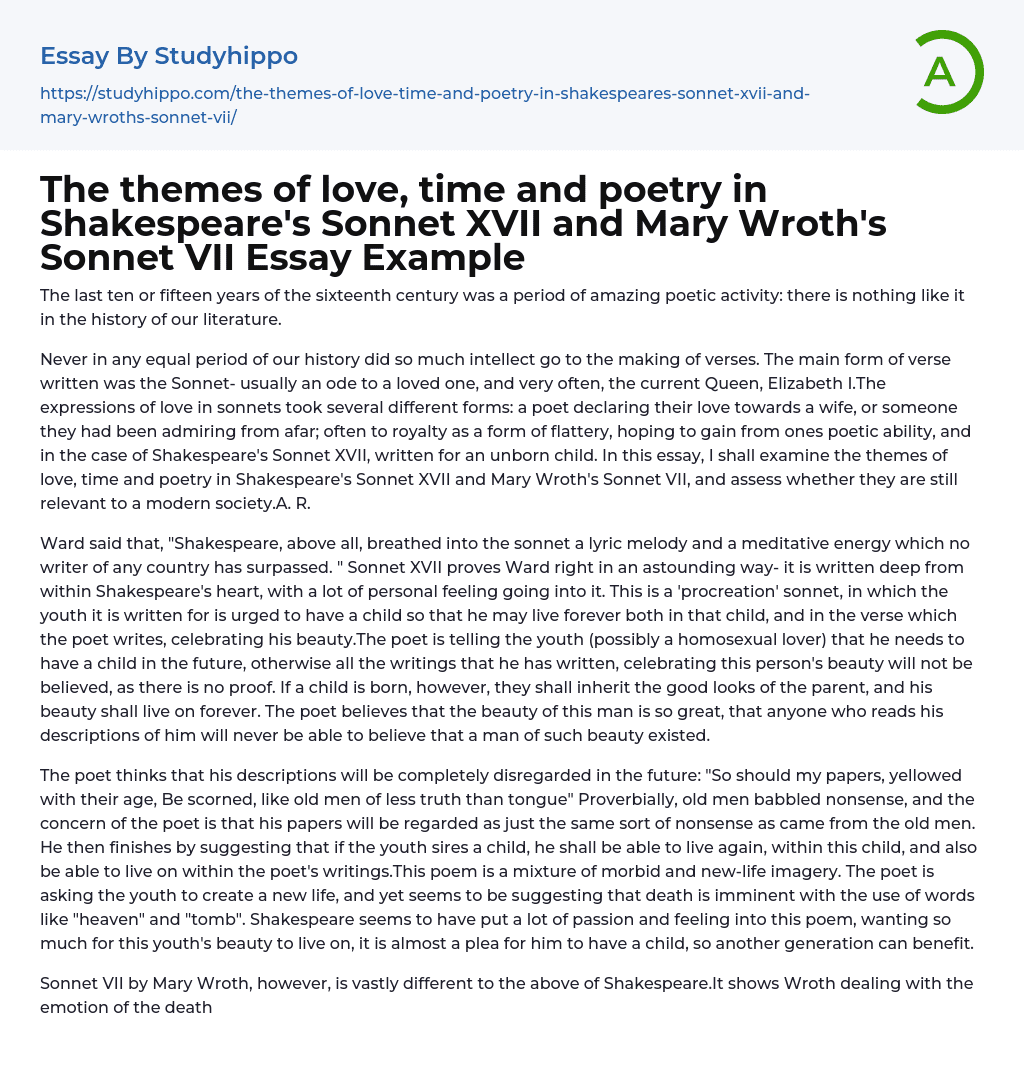

The Golden Age of Sonnets: Poetic Activity in the 16th Century
Unmatched in the history of our literature, the period of the late 16th century, specifically the last 10 to 15 years, saw an incredible surge in poetic activity.
During a particular era in history, a significant amount of intelligence was devoted to crafting poetry - particularly in the form of Sonnets. These Sonnets frequently expressed love, whether for a spouse, an unattainable crush, or even the reigning monarch. Poets often employed flattery in their Sonnets to gain favor, and Shakespeare even wrote one addressed to an unborn child. In this essay, the themes of love, time, and poetry will be examined in Shakespeare's Sonnet XVII and Mary Wroth's Sonnet VII to determine their relevancy in modern society. -A. R.
According to Ward, Shakespeare elevated the sonnet with unmatched lyricism and contemplative intensity. Sonnet XVII exemplifies this clai
...m, as it emanates from Shakespeare's deeply personal emotions. It is a "procreation" sonnet, encouraging the youth it addresses - possibly a lover - to bear a child that will perpetuate both their physical beauty and the poet's written verses praising it. Without such proof, the beauty of the youth would be unfairly doubted. The poet's faith in this person's exceptional beauty is so strong that no reader could fathom such perfection truly existed.
The poet compares his future descriptions to the nonsensical babbling of old men, expressing a belief that they will be disregarded and become outdated over time. He uses the phrase "yellowed with their age" to convey this idea. Despite morbid imagery such as "heaven" and "tomb," the poem contains both death and new-life themes. Shakespeare's passion and emotion reveal his desire for the youth's beauty to endure, pleadin
for future generations to benefit from it. To ensure his legacy lives on, he encourages the youth to have a child so that he may live again through this new life and in his writings.
While Shakespeare's sonnets reflect a different tone and subject matter, Mary Wroth's Sonnet VII captures the overwhelming emotional impact of her husband's death on her life. The poet expresses how the pain seems to overpower every aspect of her life and how even time and distance cannot alleviate the longing for the love she has lost. The "smart" that has wounded her has taken over every aspect of her being, leaving her helpless in its grasp. Wroth is still in a state of transition between life before and after the devastating event, unable to comprehend the true depth of her pain.
Wroth acknowledges that no actions or words she utters can alleviate the pain in her heart. Instead, she seems to yield to the immense power of Love, letting it dominate and affect her just as it did at the start of her relationship. Wroth believes that Love's obligation is to test mankind's ability to cope with this sort of emotional agony. During periods of solitude, she contemplates strategies to free herself from Love's chains, but gradually comprehends that this was predestined to happen and there was no way for her to avoid the hurt. Towards the conclusion of the poem, Wroth appears to embrace the notion that this heartbreak occurred for a purpose and that she could not have evaded it.
The poet believes that Love is a timeless emotion, one that endures forever, and continues to grow until the end of
time when it will finally be released. The Wroth poem, in contrast to Shakespeare's, explores themes of death, mortality, and loss. The speaker expresses profound pain and sorrow, emphasized by the recurring use of negatives. Ultimately, the poem seems to be leading towards a point of finality when "the world comes to a final end"- the speaker's death- representing a release from the pain and suffering caused by love lost.
In my opinion, the speaker's loss of Love signifies the end of all purpose in her life, making her feel that there is no reason to continue living. I think that love poetry transcends time as the feelings and sentiments expressed in it have remained constant throughout history. Love remains unchanged, and any expressions related to it are still relevant today and will continue to be relevant for generations to come.
While Wroth saw time as incapable of healing her wounds, Shakespeare recognized its importance in the continuity of life and love. Personal views on time vary greatly among individuals, with some recovering from tragedy quicker than others. Ultimately, it is up to each person to form their own perspective on the matter.
- Adoption essays
- Aunt essays
- Babies essays
- Bedroom essays
- Caring essays
- Children essays
- Daughter essays
- Divorce essays
- Dog essays
- Dysfunctional Family essays
- Family Tradition essays
- Family Values essays
- Father essays
- Foster Care essays
- Friends essays
- Grandparent essays
- Home essays
- Hometown essays
- Husband essays
- Jealousy essays
- Love essays
- Marriage essays
- Mother essays
- Online Dating essays
- Parenting essays
- Parenting Teens essays
- Parents essays
- Relationship essays
- Room essays
- Sibling essays
- Sister essays
- Wedding essays
- Wife essays
- Allegory essays
- Alliteration essays
- Comedy essays
- Comic book essays
- Drama essays
- Dystopia essays
- Fairy Tale essays
- Fantasy essays
- Fiction essays
- Ghost essays
- Gothic Fiction essays
- Gothic Literature essays
- Irony essays
- Legend essays
- Memoir essays
- Novel essays
- Poetry essays



